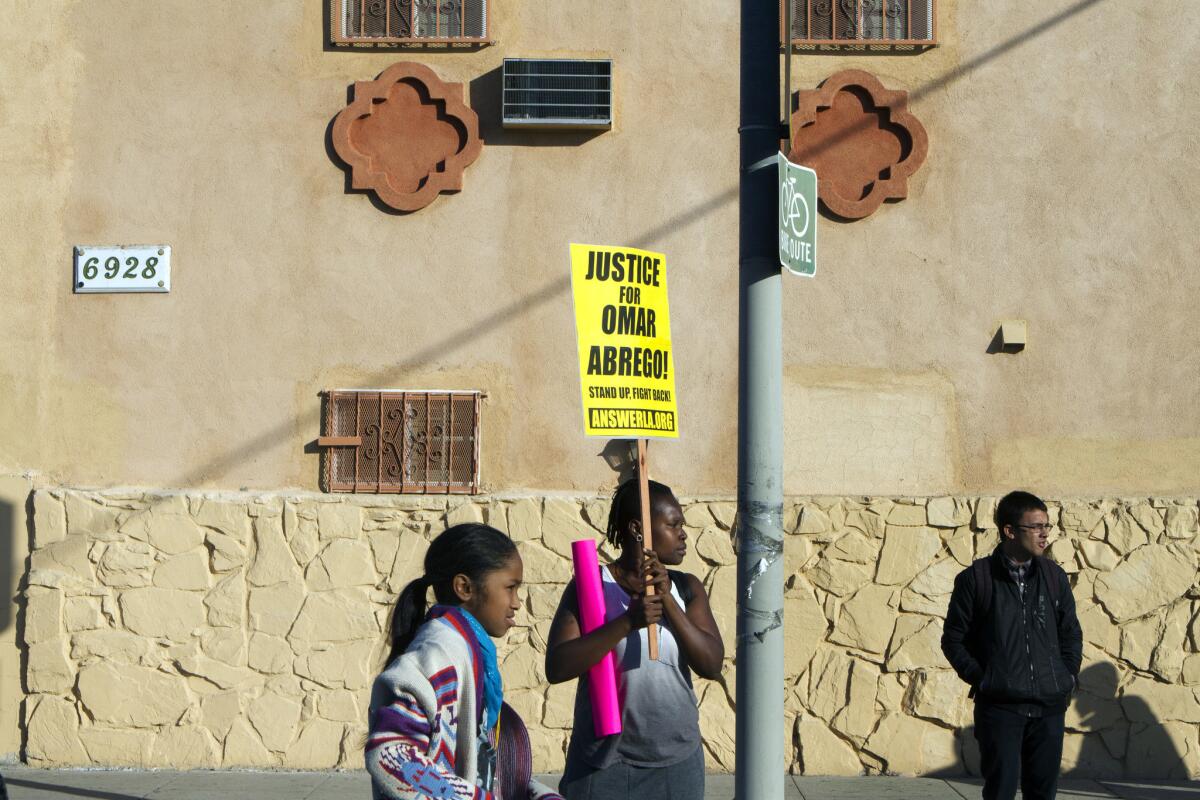Autopsy: Omar Abrego died of cocaine effects and ‘duress’ from arrest

Lawrencia Colding, center, protests at 65th Street and Broadway in South Los Angeles on Jan. 3 over the death of Omar Abrego, who died hours after being arrested by police last year.
- Share via
Los Angeles County coroner’s officials determined that a man who died last year after struggling with two LAPD sergeants during an arrest in South L.A. died from the effects of cocaine but also suffered “physical and emotional duress while taken under custody,” according to an autopsy report issued Tuesday.
Omar Abrego, 37, tested positive for cocaine and had multiple cuts and bruises after his August 2 arrest, the report said.
While saying that the cocaine caused Abrego to display “bizarre behavior and agitation,” the autopsy also said “there is a temporal relationship between the arrest maneuver and death which complicated the acute cocaine intoxication.”
The autopsy report lists the effects of cocaine as the cause of death. The “physical and emotional duress” Abrego suffered was included under “conditions contributing but not related to the immediate cause of death.”
The coroner’s office at first described the cause of death as “undetermined” but ultimately ruled it a homicide. Homicide is the standard coroner’s classification for a death caused by the hand of another.
The release of the autopsy marks the first time in about six months that authorities have provided details about Abrego’s August 3 death.
“I hope that the release of the autopsy gives some degree of closure to Mr. Abrego’s family and that the details disclosed answer some of the questions posed by the community,” LAPD Chief Charlie Beck told The Times. “The investigation is ongoing and once completed will undergo multiple layers of scrutiny to determine the propriety and legality of the sergeants’ actions.”
Attorney Steven Lerman, who is representing Abrego’s family, said Tuesday that he would have his own forensic expert review the coroner’s findings. Abrego’s family filed a federal civil rights lawsuit last month, alleging that the sergeants used unreasonable and excessive force.
“We’re going forward 100%, notwithstanding the autopsy report,” Lerman said.
Abrego died roughly 12 hours after he was detained by two gang unit sergeants assigned to the Los Angeles Police Department’s Newton Division.
The sergeants, identified as Jeff Mares and Robert Calderon, have each spent more than two decades with the LAPD. They have since returned to the field, a department spokesman said Tuesday.
The LAPD said investigations of the incident by the department, the agency’s inspector general and district attorney’s office are continuing.
The incident began the evening of August 2, when a resident flagged down the two sergeants about a “suspicious white vehicle in the area,” according to an LAPD statement released within days of the incident. The sergeants then noticed a white vehicle that was driving fast and erratically, and nearly hit a pedestrian who was crossing the street.
When the sergeants reached the 6900 block of South Main Street, the driver stopped the car, jumped out and tried to run away, the statement said.
“A physical altercation ensued and the sergeants were able to take the suspect into custody,” the statement said.
A video of the incident captured with a bystander’s phone and posted online showed Abrego bloodied and lying face down at the curb with two uniformed LAPD officers holding him down.
The LAPD said the man -- later identified as Abrego -- was taken to a hospital to treat a cut.
The autopsy report said Abrego was brought to Centinela Hospital in Inglewood and treated for renal failure and rhabdomyolysis, a toxic breakdown of muscle tissue. The autopsy said he had also suffered a blunt-force injury to his head that was self-inflicted from striking his head on the ground.
He was pronounced dead about 5 a.m.
The LAPD said both sergeants were injured in the struggle: one fractured a hand, the other hurt his knee.
Abrego died about a week before two other Newton officers shot and killed a mentally ill man in South L.A., just blocks from where Abrego was detained. The shooting of Ezell Ford -- and the four-month delay in releasing his autopsy -- prompted local protests and criticism of a lack of transparency by police.
Although Ford’s death received more public attention, Abrego’s name was also mentioned by local protesters. The South-Central Neighborhood Council passed a resolution last year calling for L.A. Councilman Curren Price to take action and get both autopsies released.
LAPD Cmdr. Andrew Smith said both autopsies were initially sealed by police to allow investigators to seek out witnesses without tainting their statements with information from the coroner’s report. But the LAPD’s Force Investigation Division, which investigates police shootings, continued to hold the report in Abrego’s case because investigators needed “clarification on some issues regarding the autopsy,” Smith said.
Attorneys representing Abrego’s family filed a federal civil rights lawsuit last month, alleging the officers used unreasonable and excessive force.
During a recent interview with The Times, Sgt. Mares declined to discuss the details of the incident, citing the ongoing investigation. But he expressed sympathy toward Abrego’s relatives.
“Of course I think about it. It’s nothing I’m proud of,” Mares said. “For any officer to have to go through that -- it’s not a badge of honor. It’s not bragging rights. Of course I feel for the family.”
Follow @katemather on Twitter for more LAPD news.
More to Read
Sign up for Essential California
The most important California stories and recommendations in your inbox every morning.
You may occasionally receive promotional content from the Los Angeles Times.














